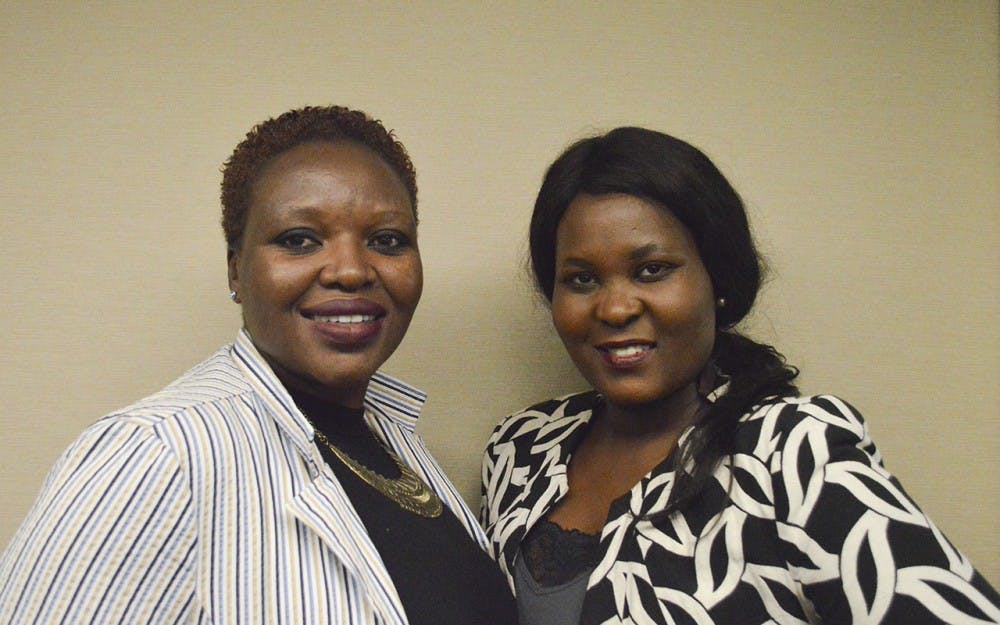Bloomington is more than 8,000 miles from Botswana, but distance is the least significant part of the journey for teachers Gaone Moloi and Keitumetse Thobani from Gaborone, Botswana, an urban city in southern Africa.
Thobani and Moloi reside at IU for the fall semester as a part of the Fulbright Distinguished Awards in Teaching Program. They join 19 other teachers from countries from Finland to Morocco in a semester-long educational exchange program.
The Center for International Education, Development and Research within the School of Education runs the program, which is sponsored by the United States Department of State, Bureau of Educational and Cultural Affairs.
The two teachers knew each other well before the program.
They both attended the University of Botswana but were selected independently for the Fulbright program.
The selection process is an intense and competitive application process that takes six to nine months, said Jacob Butlers, Fulbright project director at CIEDR.
As part of the program, Moloi and Thobani participate in a range of learning opportunities, including completion of a research project and attending two graduate-level classes.
They also observe classes at Bloomington High School North and take part in a weekly seminar for all the teachers in the program.
In Botswana, Thobani teaches at Bokamoso Junior Secondary School, a low-income school in Gaborone where she said most of the students do not receive high grades.
“That is a challenge to teach in such an environment,” Thobani said. “The parents are not very supportive. Some do not come to school because of a lack of uniform. We do the best that we can despite the situation.”
Moloi comes from a school with a different demographic.
She teaches at Maoka Junior Secondary School in Gaborone’s city center, close to many government buildings.
The students who attend her school are from well-off families and succeed because they come from private schools and because it is a safer environment, she said.
But Moloi too faces problems with parent support in the student’s education.
Because of the challenges they encounter at their respective schools, Moloi and Thobani said they wanted to be in the Fulbright program to learn new approaches to teaching.
Moloi said she appreciates seeing different perspectives for teaching.
“I had been a teacher for 10 years and had no opportunity to do something different,” Moloi said. “I took this as an advantage, and I came to learn the culture and education system of other places.”
Thobani said she sees the program as a way to bring new approaches to teaching back to her school in Botswana.
“For me, as I said, we had students who did not do well, but we have teachers who are so dedicated,” Thobani said. “Dedication can help change, but the results are too low. What can we do to improve the results? Teachers are trying everything we can that we know.”
Their research projects are part of the program designed to investigate areas they want to improve at their schools.
Moloi is studying the use of computers to learn English.
Thobani is researching differentiated learning, a learning style that involves varying the methods of teaching to best suit different types of students.
While each has a different research focus, the importance of English language learning is apparent for the English teachers.
To connect with the world, students should be able to speak English, Thobani said.
“For economic reasons, each country adopts language that economically benefits them,” Thobani said. “The powers of the world are English-speaking countries.”
Through their observations in English classes at Bloomington High School North, one aspect of American classrooms stands out as very different from their classrooms in Botswana.
The culture and the teacher-student rapport is quite different between the two countries, Thobani said.
“Students are more relaxed and they can do almost everything they want as long as they are not dancing,” Thobani said.
Thobani said in Botswana there is a wall between students and teachers and the relationship is much more formal.
But Moloi said she does see the benefits in adopting this more informal relationship between students and teachers.
“I quite like it,” Moloi said. “They are relaxed. They should not miss school. They are quite ready for learning.”
However, it is the technology and resources that Thobani and Moloi said they find most remarkable about the American classroom.
“America being a first world country, they are quite fortunate and lucky,” Thobani said. “We are still a developing country, and we are still trying to get there. Technology and everything else makes it even easier to impart knowledge. I wish that we had that back home, but we make use of whatever we have.”




